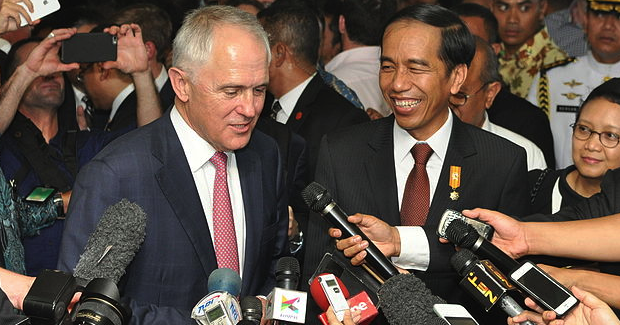Joko Widodo: Towards a New Equilibrium

Mass protests in Jakarta and looming sectarian violence compelled Indonesian President Joko Widodo to postpone his Australian visit in November. This week, military cooperation with Australia was suspended. However, at home, Widodo’s domestic reforms, including to the notorious Indonesian public service, mean public confidence in his government is likely to continue.
The Indonesian public rarely have confidence in their government. They are frustrated by an inefficient bureaucracy of 4.5 million, with incompetent officials preoccupied by moonlighting. The signs of discontent are frequent, especially when people have no choice but to rely on inefficient services.
In 2015, the World Bank reported that in Indonesia it took an average of 47.8 days to start a new business. The bribery of officials is not unusual when a member of the public wants to speed up access to a government service.
Since 1998, successive administrations have attempted to improve the public service so that it serves the public. Yet, scepticism remains. This is partly because the public still believes that Indonesia’s established political culture and practice of bureaucracy requires people to serve the government.
The cabinetmaker
President Joko Widodo, known as Jokowi, understands these complexities too well. Prior to his entrance to public office in 2005, he was an ordinary citizen without known connections to the political aristocracy, business oligarchy, or military; groups from which the nation’s political elites are typically generated.
As a cabinetmaking entrepreneur from central Java, he was acquainted with the loopholes and inefficiency of public service. Upon his elevation to the country’s top job in 2014, he reminded his ministers that their positions are not an entitlement, but a service.
Giving direction to ministers occupies a minor portion in his leadership style. Scrutinising core problems and ensuring the policy execution through frequent visits to many sites, both near and far, make up the bulk of his management style.
He knows that the notion of ‘pleasing the boss’ has been a pathological culture in government agencies. Reporting a failure is a sign of incompetence. The misinformation then continues upward resulting in no one at the higher office being able to disentangle the intricacies of a given portfolio, while the public suffers the consequences.
Jokowi’s training as entrepreneur enables him to identify bottlenecks in policy implementation to ensure that the public receive the service they should expect from the government. Moreover, he promotes accountability and transparency to address the spread of bribery, illegal fees, and corruption that often marks the unholy mutual dependence between the public and government officials.
His critics target him as a public official who only pays attention to the minutiae of low-level offices. The public, however, have given him their approval; a survey in early 2016 by Saiful Mujani Research Consulting (SMRC) showed 80 per cent of respondents agreed the nation was heading in the right direction.
Boosting international trade
Jokowi is aware that overcoming the systemic problems of bureaucracy is key to increasing international trade. In turn, more international trade will accelerate foreign investment and domestic economic development. He is a person who would normally do his homework before going overseas to seal an international commitment and he understands that without domestic reform, Indonesia’s comparative advantages will not spontaneously make it appealing, let alone competitive, in global trade. Recent reform efforts include Jokowi’s move to reduce the fuel subsidy that his predecessors, concerned with losing electoral support, were reluctant to introduce.
Considering the achievements of his first two years, Jokowi’s planned trip to Australia implied further progress and not just a symbolic diplomatic gesture aimed at enhaning his international image.
Sectarian tensions
It was unfortunate that the November visit was cancelled when mass protests swept through Jakarta creating a potential political crisis. The protests, organised by an outspoken Islamic group, demanded the persecution of Jakarta governor, Basuki Purnamaor or Ahok, for alleged blasphemy.
The protests appeared to be political given the persecution would disqualify Ahok, a non-Muslim of Chinese descent and Jokowi’s deputy during his tenure as Jakarta governor, in the upcoming election for the nation’s capital governorship. Presumably it would give advantage to his two rivals, one of whom is Agus Harimurti, a retired army major and the son of Susilo Bambang Yudhoyono (SBY), Jokowi’s immediate predecessor. The rivals are backed by major Islamic-based parties and political forces linked to SBY and Jokowi’s rival during 2014 presidential election, Prabowo Subianto.
Days before he had been scheduled to leave for Sydney, Jokowi realised that he had a domestic assignment that had received little attention in his administration. He knew that a failure to quell the resentment—and potential sectarian conflict—would taint not only his leadership but also the nation’s reputation. During that November and afterward, the president was as busy as he had been before. He approached Prabowo Subianto, whom he believed to have clout with Islamic elements. His visit to the ranch of the retired army general, a horse enthusiast, included a scene in which both men were sitting on the back of two horses while making statements promoting peace and tolerance. Some meetings with leaders of moderate Muslim organisations and political parties were also held in the presidential palace in the hope of sending a message to pacify the angry mass. The protests turned out to be relatively peaceful with only some incidence of isolated anarchy.
The trial of Ahok is now underway, thanks to the police and the public prosecutor adopting a super-fast investigative process, which is relatively rare in Indonesia. All the while, Jokowi struggles to maintain his impartiality as Ahok’s chances of walking free from the allegations are as thin as in other cases of blasphemy (very thin).
The exploitation of religious and ethnic sentiment for political gain reveals not only a proxy struggle at the national level, but it also exposes the vulnerability of Indonesia’s long-term credibility as a model for religious tolerance and cultural harmony.
Policy for cultural pluralism
Jokowi’s cancellation of his visit to Australia is more than just a delayed opportunity for Malcolm Turnbull to celebrate a high point in contemporary bilateral relations of the two nations. It is a reminder that relations with Indonesia are not merely about developmental cooperation, joint security efforts, trade deals, and tourist exchange. Beyond these business-as-usual matters, Jokowi—as much as his predecessors—remains short on addressing the issue of cultural diversity and religious pluralism. These are areas that have been crucial for successive administrations in Jakarta’s efforts to assert Indonesia’s soft power both regionally and globally.
The global community is familiar with lines delivered by world leaders, including Barrack Obama, about Indonesia being a nation in harmony despite its cultural diversity. Successive presidents—either appointed or elected—in post-authoritarian Indonesia have generally been known for their moderate stance and democratic platform. Their democratic elevation to power may be viewed as the representation of popular aspirations for democracy and centrism.
Yet, no one has hitherto been able to translate this mandate into a robust policy to address the vulnerability of Indonesia’s cultural pluralism. Social instability is certainly the last thing any government in Jakarta would expect from the recent developments. But not being decisive or, worse, bowing down to pressures wrapped in sectarian sentiment and hatred reveal that political calculations are constantly being made, even by Jokowi.
Despite this recent debacle, in my view, the public in Indonesia is still likely to maintain confidence in their president. Jokowi knows too well that he will have to wait until his own confidence is restored before addressing his foreign counterparts.
It is not only about declaring Indonesia ‘open for business’; it is also about demonstrating that his country is the example of new democracy and a celebrated case of diversity amidst the global fear of terrorism and fundamentalism.
The delayed Australian visit may give Malcolm Turnbull more time to find alternatives to formulaic terms about Indonesia’s unity in diversity when he receives his honourable guest, should Jokowi ultimately come down under.
Dr Nicolaas Warouw is coordinator of Indonesian Studies at UNSW Canberra at ADFA.
This article is published under a Creative Commons Licence and may be republished with attribution.





